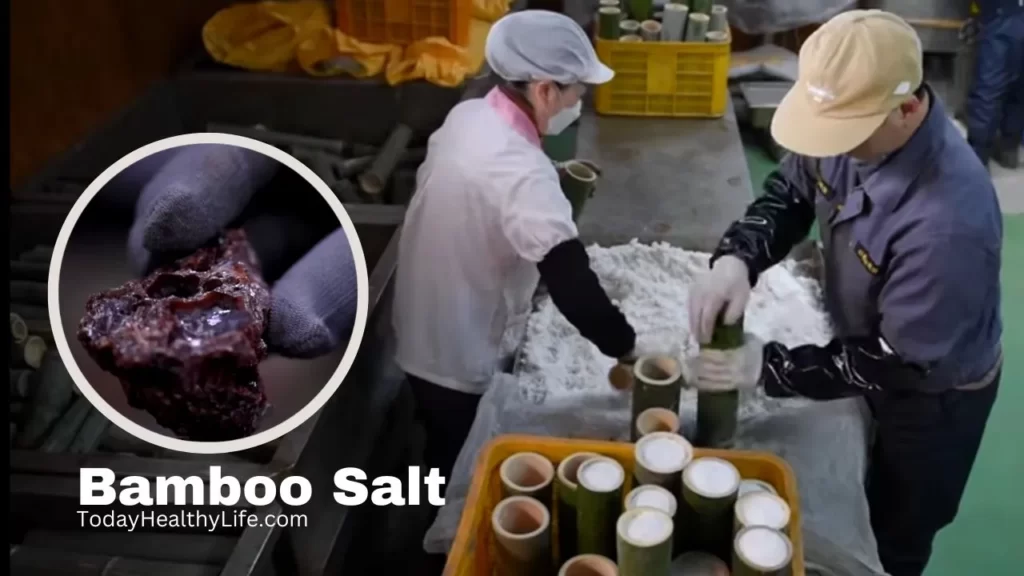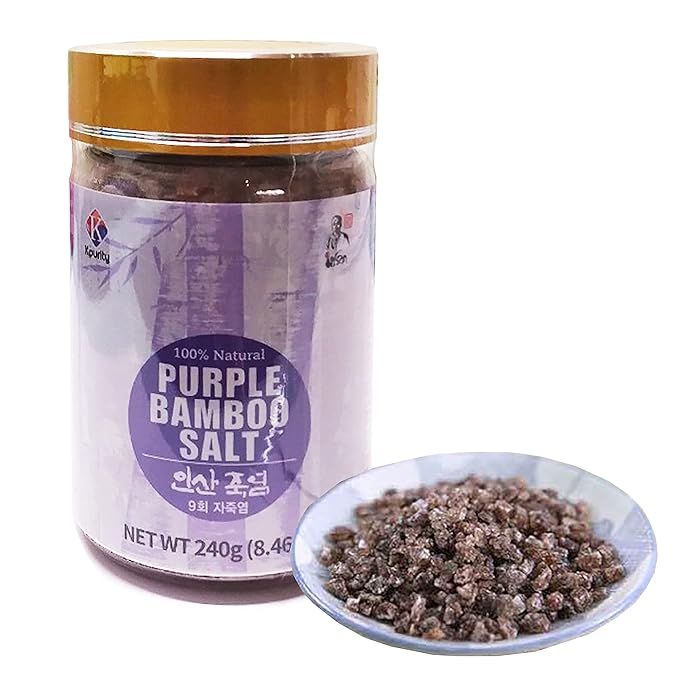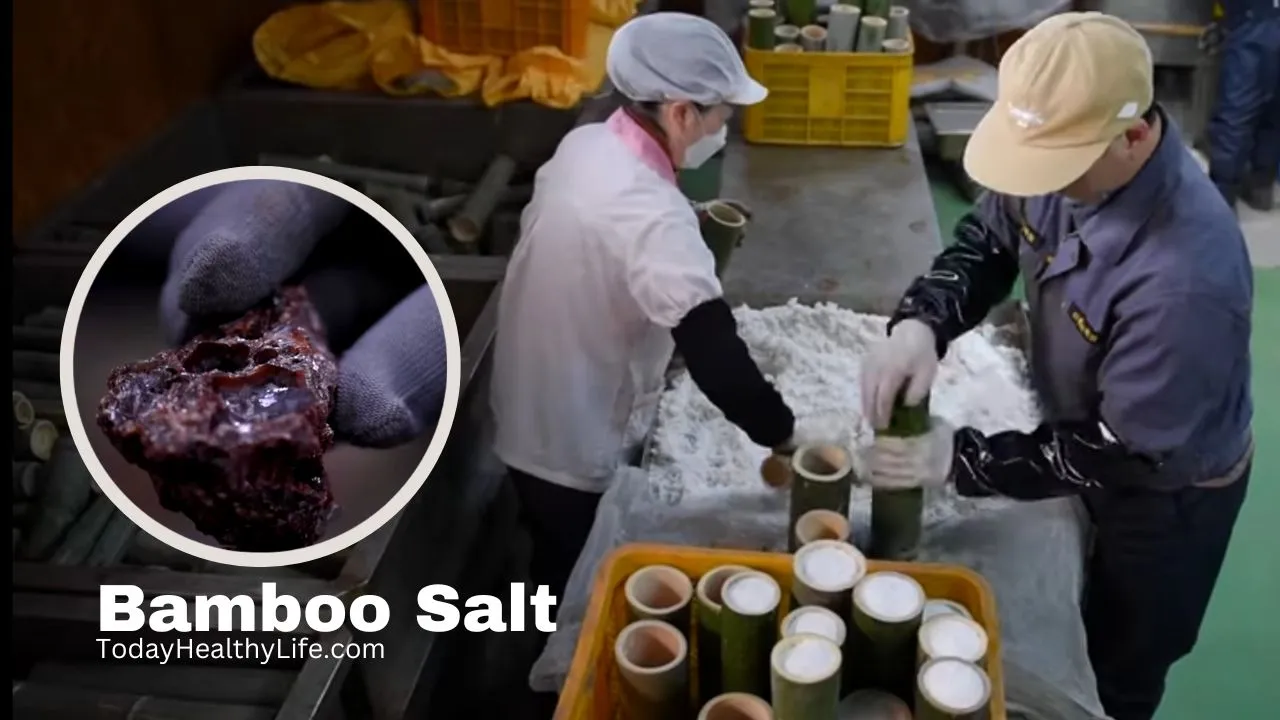Are you looking for a healthy salt to add to your food? If so, you may have heard of bamboo salt. This unique type of salt is made from the ashes of burned bamboo.
It is said to have numerous health benefits, including reducing inflammation, improving blood sugar control, and boosting immunity.
But is it worth the price? And are there any potential side effects? Let’s take a closer look at bamboo salt and see what the evidence says.

Table of Contents
What is bamboo salt?
Bamboo salt is a type of salt that is made by heating bamboo charcoal in a kiln. The resulting product is a black salt that has a strong flavor and is rich in minerals.
Bamboo salt can be used in cooking as a seasoning or as a finishing salt. It is also sometimes used in traditional medicine.
Because this salt is high in minerals, it is believed to have health benefits such as aiding digestion, improving circulation, and boosting immunity. Additionally, it is thought to have detoxifying properties.
Bamboo salt is mainly produced in Korea and it can be found in Asian markets or online. It is typically sold in powder or granule form.
Also Read:
- What Is Bamboo Salt Used For?
- What are the health benefits & harms of drinking salt water?
Nutrition Facts
Here is the nutrition chart for bamboo salt per 100 grams:
| Nutrient | Amount |
|---|---|
| Calories | 0 |
| Total Fat | 0 g |
| Saturated Fat | 0 g |
| Polyunsaturated Fat | 0 g |
| Monounsaturated Fat | 0 g |
| Cholesterol | 0 mg |
| Sodium | 190 mg |
| Potassium | 43 mg |
| Total Carbohydrates | 0 g |
| Dietary Fiber | 0 g |
| Sugars | 0 g |
| Protein | 0 g |
| Calcium | 370 mg |
| Iron | 1 mg |
| Magnesium | 32 mg |
| Manganese | 0.2 mg |
| Phosphorus | 200 mg |
| Potassium | 43 mg |
| Zinc | 0.4 mg |
As you can see, bamboo salt is very low in calories and fat, and it contains no carbohydrates, sugars, or protein.
It is also a good source of minerals, including calcium, iron, magnesium, manganese, phosphorus, potassium, and zinc.
Bamboo salt is made by roasting sea salt in bamboo tubes. The roasting process causes the salt to absorb minerals from the bamboo, which gives it its unique flavor and color.
Bamboo salt is often used in Korean cuisine, but it can also be used in other dishes.
Benefits of bamboo salt
Bamboo salt, also known as Jukyeom or Jookyeom, is a traditional Korean salt that has gained popularity for its potential health benefits.
While scientific research on bamboo salt is limited, it is believed to offer several advantages based on traditional knowledge and anecdotal evidence.
Here are some of the potential benefits associated with bamboo salt:
- Mineral content: Bamboo salt is often touted as a rich source of minerals. The salt is typically heated multiple times in bamboo trunks, which are believed to infuse the salt with various minerals present in the bamboo. These minerals may include calcium, potassium, magnesium, iron, and zinc, among others. However, the exact mineral composition can vary depending on the manufacturing process.
- Antioxidant properties: Bamboo salt is believed to possess antioxidant properties that help protect the body against oxidative stress and free radicals. Antioxidants play a crucial role in neutralizing harmful molecules and may have potential benefits for overall health and well-being.
- Alkalizing effect: Bamboo salt is said to have an alkalizing effect on the body. It is believed that regular consumption of bamboo salt can help balance the body’s pH levels, which may contribute to better overall health.
- Detoxification: Bamboo salt is commonly used in traditional medicine for its detoxifying properties. It is believed to aid in the removal of toxins from the body, promoting cleansing and purification.
- Digestive health: Some proponents claim that bamboo salt can support digestive health. It is believed to stimulate digestion, promote nutrient absorption, and help maintain a healthy gastrointestinal system.
It’s important to note that while bamboo salt has a long history of traditional use and anecdotal evidence supporting its benefits, scientific research on its specific effects and mechanisms of action is limited.
If you’re considering using bamboo salt for its potential health benefits, it’s advisable to consult with a healthcare professional or a qualified herbalist familiar with traditional medicine to ensure it is appropriate for your individual circumstances.
Using bamboo salt
Bamboo salt can be used in a variety of ways, both in cooking and for health benefits. Here are a few ideas:
- In cooking: Bamboo salt can be used as a substitute for regular salt in any dish. It has a slightly sweet and salty flavor with a hint of sulfur, which can add depth and complexity to your dishes. It is especially good in soups, stews, and braises.
- For oral health: Bamboo salt can be used to brush your teeth. It is a natural abrasive that can help to remove plaque and tartar, and it also contains minerals that can help to strengthen your teeth and gums.
- For skin care: Bamboo salt can be used to make a natural scrub for your face or body. It can help to exfoliate your skin and remove dead cells, leaving your skin feeling smooth and refreshed.
- For detoxification: Bamboo salt can be used to make a detox bath. Add a few tablespoons of bamboo salt to your bathwater and soak for 20-30 minutes. The salt can help to draw out toxins from your body through your skin.
- As a supplement: Bamboo salt can be taken as a supplement by dissolving a few grains in water and drinking it once or twice daily. It is a good source of minerals, including calcium, magnesium, and potassium.
It is important to note that bamboo salt is a type of sea salt, so it is high in sodium.
If you are on a low-sodium diet, you may want to avoid bamboo salt or use it in moderation.
Side effects and precautions
While bamboo salt is generally considered safe for consumption, it’s important to be aware of potential side effects and take precautions when using it.
Here are some considerations to keep in mind:
- High sodium content: Bamboo salt, like regular salt, contains sodium. Excessive sodium intake can contribute to high blood pressure and other cardiovascular issues. If you have a pre-existing condition such as hypertension or are on a sodium-restricted diet, it’s important to monitor your salt intake, including bamboo salt. Moderation is key.
- Allergies or sensitivities: Individuals with known allergies or sensitivities to salt or bamboo products should exercise caution when using bamboo salt. If you experience any adverse reactions, such as skin rashes, swelling, or difficulty breathing, discontinue use and seek medical attention.
- Interaction with medications: Bamboo salt, as a sodium-containing product, may interact with certain medications, such as those used to manage high blood pressure or fluid retention. If you’re taking any medications, it’s best to consult with your healthcare provider before incorporating bamboo salt into your diet.
- Quality and sourcing: Ensure that you obtain bamboo salt from reputable sources to ensure quality and authenticity. As with any food product, there may be variations in manufacturing processes and quality control, so it’s important to choose reliable brands.
- Individual tolerance: Everyone’s body reacts differently to substances, including bamboo salt. It’s possible that some individuals may experience digestive discomfort, such as bloating or upset stomach, when consuming bamboo salt. If you notice any adverse effects, reduce your intake or discontinue use.
As with any dietary change or addition, it’s advisable to consult with a healthcare professional, especially if you have any underlying health conditions, are on medication, or have specific dietary restrictions.
Remember, while bamboo salt has been used traditionally and is believed to have certain benefits, scientific evidence supporting its specific effects and safety is limited.
It’s always best to make informed decisions and prioritize your individual health needs.
Where to buy

Bamboo salt can be purchased from various sources, both online and offline. Here are a few options to consider:
- Local Asian grocery stores: Look for bamboo salt in the seasoning or salt section of your local Asian grocery store. These stores often carry a variety of Korean food products, including bamboo salt.
- Online retailers: Several online retailers specialize in Asian food products and offer a wide range of bamboo salt options. Websites such as Amazon, eBay, and specialized Korean food stores like Hmart, Kim’s Asian Market, or Asian Food Grocer may have bamboo salt available for purchase.
- Health food stores: Some health food stores or specialty stores that focus on natural and organic products may carry bamboo salt. Check with your local health food store to see if they stock it.
- Korean markets or specialty stores: If you have access to Korean markets or specialty stores, they are likely to carry bamboo salt. These stores often have a wider selection of Korean food products, including bamboo salt.
When purchasing bamboo salt, consider checking the reviews and ratings of the product or seller, and ensure that the product is sourced from a reputable brand or manufacturer.
This can help ensure the quality and authenticity of the bamboo salt you purchase.
Remember to verify the product’s nutritional information and any specific details, such as the level of heating or processing involved, to align with your preferences and dietary needs.
Price:
The price of bamboo salt can vary depending on factors such as the brand, quality, quantity, and where it is purchased.
Here are some general price ranges to give you an idea:
- Low to moderate quality: In general, lower quality bamboo salt may be available at lower prices. Prices can range from $5 to $15 USD for smaller quantities, such as 100 grams or 250 grams.
- Higher quality or premium brands: High-quality bamboo salt, often produced through more meticulous processes, may be priced higher. Premium brands or those with specific certifications may charge a premium for their products. Prices for premium bamboo salt can range from $20 to $50 USD or even higher for larger quantities, such as 500 grams or 1 kilogram.
Please note that these price ranges are approximate and can vary based on location, brand, and other factors. It’s advisable to check with specific retailers or online sellers to get the most accurate and up-to-date pricing information.
Additionally, keep in mind that the price of bamboo salt is often influenced by factors such as its mineral content, processing methods, reputation, and the market demand for the product. Consider your budget and preferences when selecting a bamboo salt product that suits your needs.
What is the difference between normal salt and bamboo salt?
Normal salt is simply mined from the earth and refined, while bamboo salt is made by placing sea salt inside hollowed-out bamboo shoots and heating them over an oak or pine fire.
This process is repeated multiple times, with the number of repetitions affecting the color and taste of the final product.
It is also believed to enhance the salt’s health benefits. Additionally, normal salt typically has added iodine and anti-caking agents, while bamboo salt does not.
Some related FAQs:
It can be used as a seasoning or finishing salt, but it may not work well in all recipes due to its strong, smoky flavor.
There is currently not enough research to determine the safety and effectiveness of bamboo salt for medicinal purposes. It should not be used as a replacement for medical treatment.
Some people use bamboo salt topically on the skin for issues such as insect bites or rashes, but there is not enough research to determine its effectiveness or safety for this purpose. It is best to speak with a healthcare professional before using bamboo salt topically.
There is currently not enough research to determine the safety of bamboo salt in humans, so it should be used with caution.
It may interact with certain medications and may cause side effects such as stomach upset or high blood pressure in some individuals.
As with all salts, it is important to use bamboo salt in moderation to avoid excessive sodium intake.
Yes, bamboo salt is typically more expensive due to its processing method and potential health benefits. Costs for a 1-pound (454-gram) bag range from $10 to $20.
Conclusion
Bamboo salt is a unique and beneficial seasoning that can be used in many different ways. It has a high nutritional value and contains important minerals that are essential for good health.
Additionally, it has anti-inflammatory and antioxidant properties, which make it an ideal choice for people who want to improve their health.
Although bamboo salt does have some side effects, these are generally mild and can be avoided by using salt in moderation.
Overall, bamboo salt is a healthy and versatile seasoning that should be added to everyone’s pantry.
Have you tried bamboo salt before? What did you think of it?


